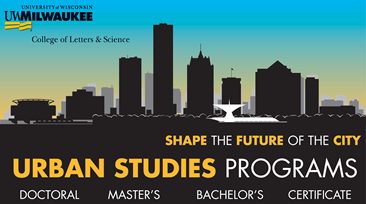
Program Description
Urban Studies Programs (USP) is an interdisciplinary set of degree programs in the College of Letters and Science at the University of Wisconsin-Milwaukee (UWM), an R1 urban, research public university. Our 20-plus faculty are drawn from ten disciplines and professional fields across fours schools and colleges. USP offers an undergraduate certificate and major, and graduate Master’s and PhD program degrees. USP degree program curriculum draw on different disciplinary lenses, frameworks, and methodologies to examine and study urban problems, development, and change that focus on a wide variety of neighborhood, urban, suburban, regional, and global contexts, and that consider their implications for social and public policy. USP is affiliated with the Center for Economic Development (CED), and is the institutional home for the Urban Affairs Association (UAA), the international professional association for urban scholars, researchers, and public service professionals. Our over 800 alumni have gone on to distinguished careers in academia, research institutions, all levels of government, and across the nonprofit sector, providing leadership in community, human service, and advocacy organizations, locally as well as across the country and internationally.
Mission Statement
It is the mission of Urban Studies Programs (USP) to provide an array of undergraduate and graduate programs that educates students to be effective practitioners, researchers, scholars, educators, and leaders in urban organizations, public agencies, nonprofit and community organizations, higher education, public policy and urban affairs; to promote multidisciplinary urban research and scholarship; and to engage in community outreach that expands knowledge and our ability to work collectively to address the economic, social, and political issues facing our diverse society.
Goals
To carry out its mission, USP has established the following goals:
- To deliver high quality academic programs in urban studies by top ranked faculty;
- To assemble and support a diverse faculty composed of individuals from varied disciplines with common interests related to the urban within the social sciences and humanities, urban studies, public administration and nonprofit management, public policy and urban affairs, and the planning and design fields;
- As related to our graduate students and programs: To equip graduate students with current and relevant theoretical and historical knowledge and methodological skills in preparation for their prelim and thesis and dissertation work from a set of topical specializations and methodological tracks that correspond to faculty area strengths and student career paths; to provide opportunities for graduate students to engage in the creation, sharing, and application of scholarly knowledge and practice through course work, independent research, community internships, Project Assistantships, involvement in USP’s ejournal, e.polis, participation in the Urban Affairs Association and other relevant conferences, and by active engagement with scholars and community leaders through the USP speaker series, the Milwaukee Summit, and the Student Research Forum;
- As related to our undergraduate students and programs: To offer undergraduate students course work and degree programs that provide the opportunity to explore and study neighborhoods, cities and suburban communities, and metropolitan regions with an interdisciplinary approach and that provide an understanding of the nature of cities and urban society, the basis for urban development and change, and the significance of those changes for our contemporary world; to develop the research skills and theoretical knowledge necessary to carry out a research project and present their findings in a conference setting; to introduce students to the study of urban studies and related professional fields (public administration, nonprofit organizations and leadership, urban planning, etc.) that are tied to specific career paths based on student background and interests;
- To produce graduates with the ability to apply their knowledge to understanding and resolving economic, social, and political problems facing a diverse society, and to perform as successful scholars and practitioners in their field of choice.